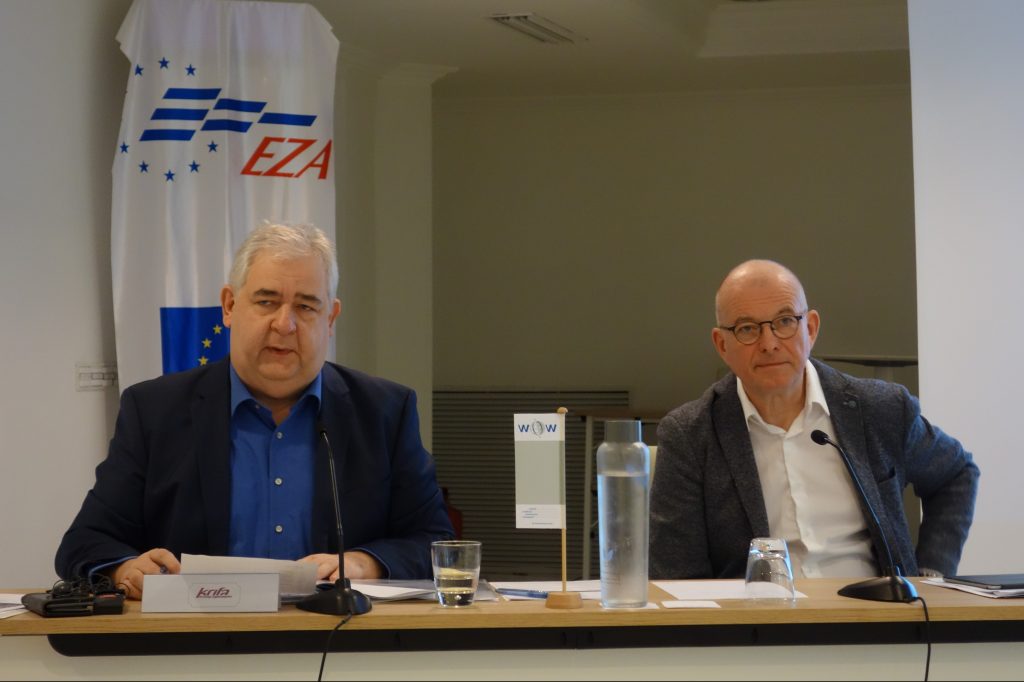“Is there a future for trade unions?” This was the central question during a two-day seminar that took place in Palma de Mallorca, Spain. The seminar, which was organised by Krifa and the World Organization of Workers (WOW) in cooperation with the European Centre for Workers’ Questions (EZA) and supported by the European Commission focused on the most important question for trade unions today. How to remain relevant and in what way to do achieve this?
From 06 – 08 February 2019 more than 50 delegates from 14 different EU-countries participated in this very topical seminar. Trade unions today are struggling with their image. There are a number of quite different reasons for that. Most important however is for trade unions to remain of interest and to remain and/or again become relevant. This is big challenge for unions which long had strong positions and perhaps did not act to the changes taking place timely.
The president of Krifa, Søren Fibiger Olesen opened the seminar by stating that despite all the challenges both in the world as for trade unions, a world without trade unions is hard to imagine. Fritz Neugebauer of EZA confirmed that there are indeed a lot of challenges. In Europe one can see that the social component is under pressure. The trade union movement is in essence a social movement and thus there is certainly a future for trade unions. More so than ever!
María Luz Rodríguez Fernández in her contribution titled “Union organization and strategy in the face of the challenges of the technological revolution” showed that a new type of unionism is, at least in Spain, resulting in new enthusiasm for the movement. New times demand a proactive approach. It will be essential to combine classical trade union action with innovative trade union action.
The strategies of the trade union of the future are quite diverse. There are numerous factors why a person does or does not become a member of a union. To understand these reasons unions will have to explore all the actors explaining union membership. Karin Schönplug, stressed that unionizing should be considered social capital (structural, relational, cognitive). Furthermore, unions will have to find strategies and take decisions in a labour world which is hypermobile.
Remaining relevant in such a hypermobile world is not apparent. Digitalization further complicates this. Certainly as a value based organization. Thomas Bank Møller pointed out that it does not make sense to confront the developments. Instead we should embrace them. Members expect an organization to deliver on digital services. “Every strategy in Krifa derives from the mission statement, and to us the WHY for everything we do is very important. We constantly ask ourselves WHY, and the answer must derive from our core values and the mission statement.” So despite everything new values remain essential.
Strategies are not the same everywhere. In post-socialist countries the situation is quite different. Artjoms Ivlevs stated that “Over the last 20 years, trade union membership has fallen across the globe, but particularly so in the post-socialist world.” The reasons for the falling numbers are that trade unions are not trusted. The perception of people is such that “unions are not effective, irrelevant, cannot act autonomously, conservative, cannot mobilize their members, ‘toothless’.” Despite all of this trade unions do matter and remain of relevance. Statistics show that “Union members are more likely to keep their jobs during crisis.”
Paul de Beer showed that in the Netherlands there is a “shift in power from unions to employers, that employers use collective bargaining for their own interests, and that the balance between economic and social interests lost.” For that reason “Collective interest representation of workers is still much needed.” But how will unions do this and will they be able to deliver? Paul de Beer proposes two options: (1) Revitalization of unions based on existing model; (2) A new ‘business model’ for unions (based on elections instead of membership or funded from mandatory contribution by all employees).
Mark Freeman confirmed that trade unions should constantly be open for change and adapt to the new realities. Furthermore unions in the UK should listen more to their members. Members should be the once to decide. They should be considered the top of the pyramid (i.e. invert the conventional triangle). Additionally, the young should be incorporated more too. If you consider the young the future than you should also listen to them and put word where you mouth is. Until today this is not the case.
The general perception of all who attended is that unions should really change in order to remain relevant. Positive was that all present felt that trade unions have the future and will continue to have an important role to play on the labour-market and in society as a whole.
for pictures click here





